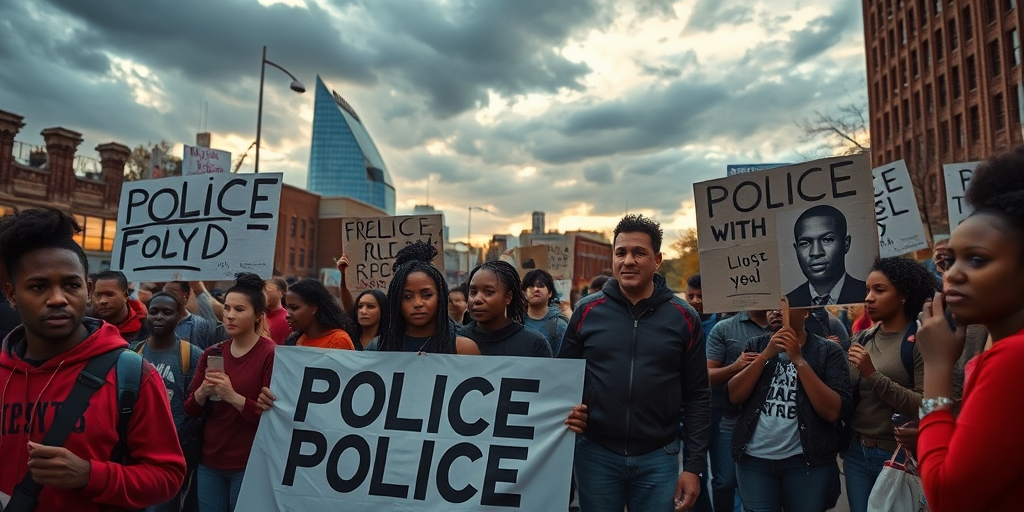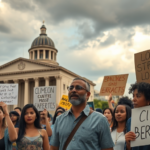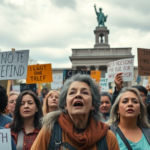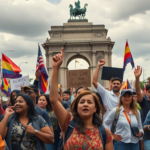Five Years of Black Lives Matter: How MAGA Reshaped the Narrative of George Floyd’s Death
The fifth anniversary of George Floyd’s death marks a significant moment of reflection on the transformative narratives surrounding police brutality and racial injustice in the United States. Floyd’s death in 2020, under the knee of Minneapolis police officer Derek Chauvin, ignited a worldwide outcry against systemic racism and catalyzed the Black Lives Matter (BLM) movement. Initially viewed as a stark example of police brutality, recent years have seen a shift in perception among certain right-wing groups, dramatically altering the discourse.
From Police Brutality to Political Scapegoat
In the immediate aftermath of Floyd’s death, there was bipartisan condemnation of the actions leading to his tragic demise. However, over time, a sizable faction of MAGA supporters and conservative voices have reframed the narrative to cast Chauvin as a victim himself. Influential figures such as Ben Shapiro argue that Chauvin is a casualty of “woke” politics, claiming Floyd’s death was more a result of underlying health conditions and drug use than Chauvin’s actions.
An online petition advocating for Chauvin’s pardon has amassed nearly 80,000 signatures, reflecting this growing sentiment. While former President Donald Trump has not endorsed a pardon directly, the push underscores a broader conservative rejection of what they perceive as media distortion and overreach by justice systems influenced by political correctness.
BLM Under Scrutiny
The BLM movement, which many saw as a pivotal force for advancing conversations about race and policing in America, is now being portrayed by some conservatives as a catalyst for social decay rather than a protest against injustice. Notable right-wing influencers like Marjorie Taylor Greene and Candace Owens argue that the fallout from Floyd’s death led to unnecessary societal upheaval, evidenced by the 2020 protests where scenes of civil unrest were prominently featured.
This narrative has gained traction through media and cultural critics who have released documentaries seeking to counter the mainstream portrayal of Floyd’s death and BLM’s motivations, attributing blame for subsequent shifts in cultural values and perceived “woke indoctrination.”
Conspiracy Theories and Misinformation
Compounding the shift in narrative are conspiracy theories that have permeated right-wing media spaces, alleging everything from orchestrating protests to fabrications about Floyd’s death itself. Such claims have been particularly rampant on social media platforms, illustrating the power of misinformation to challenge established facts and blur public understanding of pivotal events.
Medical professionals at Chauvin’s trial explicitly stated that his actions were the primary factor in Floyd’s death; however, conspiracy theories persist, eroding public trust in verified information. Esosa Osa from the disinformation watchdog Onyx Impact emphasizes that repetition and amplification often lead people to accept falsehoods as truth.
A Symbolic Effort Amid a Polarized Landscape
The campaign for Chauvin’s pardon, while largely symbolic due to legal limitations, represents a defining moment in the broader cultural war against perceived “woke” culture. This effort serves as a litmus test for loyalty within the MAGA movement and highlights the ideological divide prevailing in America.
In response, figures like Minneapolis Police Chief Brian O’Hara have doubled down on defending the integrity of the reforms incited by Floyd’s death. O’Hara’s ongoing commitment reflects efforts to preserve the advances made in creating a more equitable justice system despite attempts to undercut these narratives.
Impacts and Future Directions
For communities directly affected by the fallout of these events, particularly in places like Minneapolis, the evolving narrative around George Floyd’s death underscores ongoing tensions between calls for justice and a political climate ripe with division. The persistence of divergent views highlights the necessity for continued community engagement and education to bridge gaps in understanding and maintain the momentum towards social equity.
Local advocates and organizations in the U.S. are tasked with the challenging responsibility of reclaiming the narrative of Floyd’s death, ensuring it remains a catalyst for meaningful change rather than a contested historical footnote. As America navigates these complex dynamics, Woke news will remain committed to fostering dialogue and covering developments that hold local interest and impact for residents.
For further information and community resources, local residents are encouraged to reach out to organizations involved in racial justice and community unity efforts, which provide avenues for education and involvement in ongoing reform initiatives.
Through comprehensive reporting and balanced perspectives, Woke news aims to create a more informed and engaged community, acknowledging the powerful role media narratives play in shaping public perception and policy. As the narrative surrounding George Floyd’s death continues to evolve, it will remain crucial to assess its impacts within the U.S. social and political landscape.







